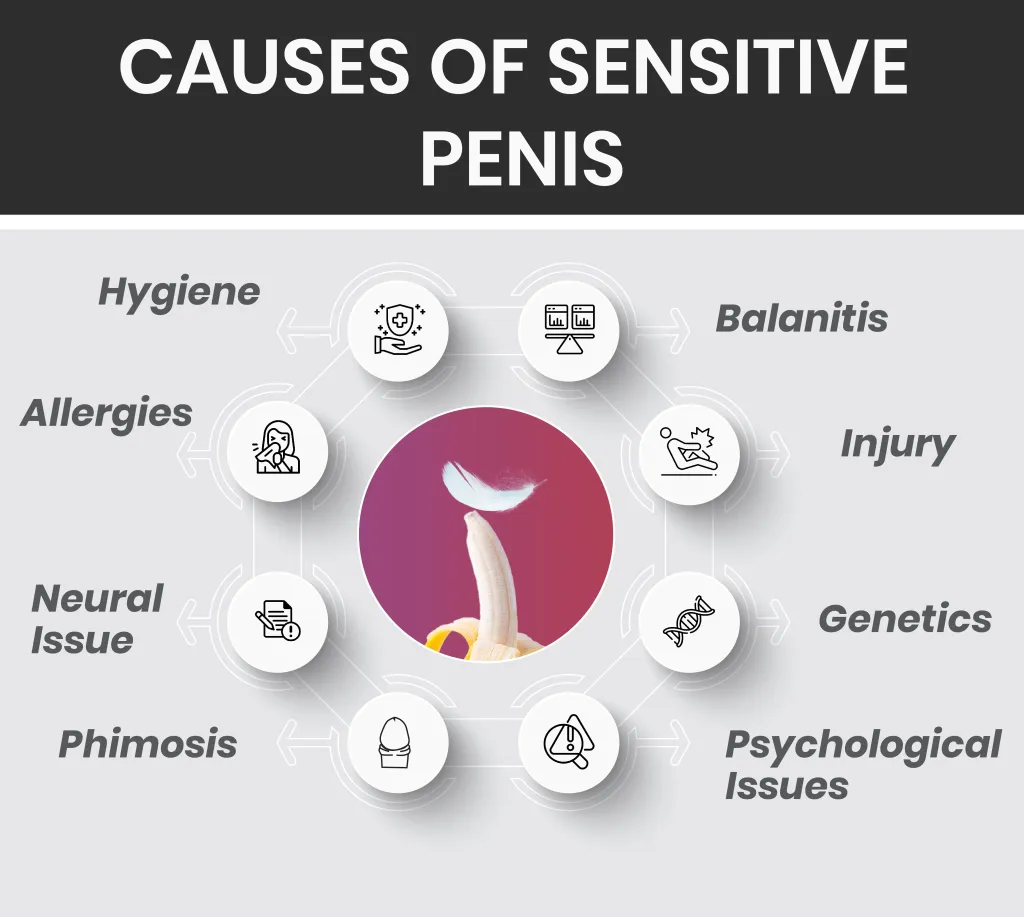Penile sensitivity is a key contributor to sexual satisfaction and overall intimacy. When sensitivity decreases, it can lead to frustration and hinder confidence in intimacy. If you’re searching for ways to increase penis sensitivity, there are practical steps and solutions available, many of which are backed by science.
This guide explores causes, helpful tips, and methods to enhance penile sensitivity, empowering you to take better control of your sexual health.
What Causes Reduced Penis Sensitivity?
Before addressing solutions, it’s important to understand the potential causes behind reduced penile sensitivity. These include:
- Masturbation Techniques
Using excessive pressure or specific repetitive hand movements (“death grip syndrome”) during masturbation can desensitize the penis over time. This leads to a reduced response to other types of stimulation.
- Physical Pressure from Lifestyle Activities
Long hours of cycling or sitting on hard surfaces can compress the nerves and blood vessels that contribute to penile sensation.
- Hormonal Imbalances
Lower testosterone levels, which naturally decline with age or due to health factors, can reduce overall sexual sensitivity and libido.
- Underlying Health Conditions
Conditions such as diabetes, multiple sclerosis (MS), and other disorders affecting nerve health can reduce penile sensitivity.
- Stress or Mental Health Issues
Anxiety, stress, and depression can interfere with sexual arousal and diminish sensation, as the brain plays a critical role in sexual response.
Understanding these factors can help identify personal challenges and lead to targeted solutions.
Tips and Methods to Increase Penile Sensitivity
1. Adjust Masturbation Habits
- Loosen Your Grip: Using a tight grip during masturbation can lead to desensitization. Lighten your grip and vary your technique to prevent further reduction in sensation.
- Take Breaks: If you masturbate frequently, consider taking a break for a few weeks to allow your penile sensitivity to recover naturally.
- Experiment with Toys and Tools: Sex toys like textured sleeves or stimulators can introduce varied sensations, providing a fresh experience.
2. Engage in New Sexual Practices
- Explore positions or techniques that increase friction during intercourse. Positions where the partner keeps their legs close together can create tighter sensations, boosting sensitivity.
- Reduce excessive lubrication during intercourse if it reduces friction, ensuring better tactile stimulation.
3. Improve Circulation
Healthy blood flow is essential for penile sensitivity and libido. Ensure consistent circulation by:
- Regularly exercising, which helps improve blood flow to all parts of the body, including the genitals.
- Avoiding restrictive clothing or prolonged sitting, especially in uncomfortable chairs.
Cyclists can switch to ergonomic bicycle seats designed to reduce perineal pressure or reduce cycling hours if sensitivity declines.
4. Address Hormonal Imbalances
If testosterone levels are contributing to reduced sensitivity:
- Incorporate lifestyle changes like weight management, strength exercises, and better sleep routines to naturally increase testosterone.
- Seek professional testing to determine if testosterone replacement therapy (TRT) is a suitable option.
5. Manage Stress and Improve Mental Well-Being
Stress and mental health factors can greatly affect your sexual response. Adopting relaxation techniques can help:
- Practice mindfulness, meditation, or yoga to lower stress.
- Take a warm bath before intimacy, as it relieves tension and promotes blood flow.
- Seek therapy or counseling if deeper mental health concerns like anxiety or depression are contributing to challenges.
6. Address Underlying Medical Conditions
Conditions such as diabetes or multiple sclerosis (MS) should be well-managed to prevent further nerve damage or sensitivity loss. Ensure that prescribed medications for chronic conditions don’t negatively affect sexual health, and work with healthcare providers for adjustments if necessary.
7. Explore Sensory Enhancement Practices
Simple sensory exercises can retrain your body to respond more to touch:
- Use textured or warming lubricants to engage new sensations.
- Engage in non-penetrative play that focuses on erogenous zones around the genitals.
8. Optimize Your Diet
Eating nutrient-rich foods helps reduce inflammation, balance hormones, and increase blood flow, contributing to better sexual health. Focus on:
- Heart-healthy fats (e.g., avocados, walnuts), which support circulation.
- Zinc-rich foods (e.g., oysters, pumpkin seeds), essential for testosterone production.
Frequently Asked Questions (FAQs)
Can reduced sensitivity be reversed?
Yes, in many cases, lost or reduced sensitivity can be improved with lifestyle adjustments, better sexual practices, and seeking medical support, if necessary. Consistency is key.
Does age always reduce penis sensitivity?
While aging can contribute to reduced sensitivity due to declining testosterone and nerve health, the right habits and interventions can help maintain or even regain sensitivity.
Is reduced sensitivity a sign of a serious health issue?
Not always, but if reduced sensitivity is sudden or accompanied by other symptoms such as erectile dysfunction, numbness, or pain, it’s best to consult a healthcare provider.
Are devices like vacuum erectile devices helpful?
While typically used for blood circulation and erectile challenges, such devices may also improve sensitivity when used correctly. Speak to a doctor before starting.
Final Thoughts on Increasing Penis Sensitivity
Reduced penile sensitivity can feel frustrating, but rest assured there are numerous ways to regain or improve sensations. From adjusting techniques to enhancing mental and physical health, small changes can lead to significant improvements over time. Remember, seeking professional advice for underlying conditions or persistent issues is always beneficial.
Your sexual health deserves care and attention. Start with these strategies, and take one step closer to reclaiming confidence and pleasure.








